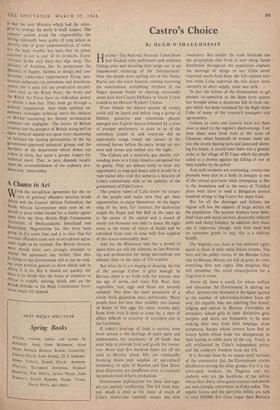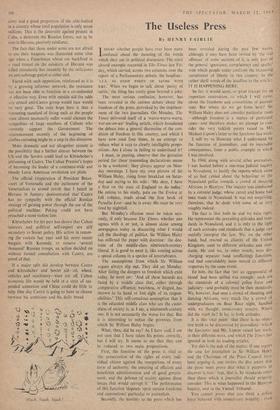Castro's Choice
By HUGH O'SHAUGHNESSY
AVANA—The National Amateur Talent Show
had finished with performers and audience linking arms and shouting their lungs out in an impassioned rendering of the 'International.' Now the people were spilling out of the Teatro Payret into the warm January evening humming the monotonous, compelling rhythms. of the Negro peasant bands or chatting animatedly about how nice Cousin Epifania or Uncle Tomas looked in the Havana Workers' Chorus, From behind the theatre sounds of revelry could still be heard and before long a group of fiddlers, guitarists and concertina players emerged into Capitol Square followed by a train of younger performers. A score or so of the onlookers joined in and everyone did an impromptu conga round the statues of the national heroes before the party broke up into twos and threes and melted into the night.
The Cubans are a naturally gay people, out- standing even in a Latin America recognised for its gaiety. They are always ready to seize any opportunity to sing and dance and it would be a rash visitor who took this scene as a measure of Cuba's contentment with or the stability of the government of Fidel Castro.
The present rulers of Cuba know the temper of the people and make sure they get their opportunities to enjoy themselves, At the begin- ning of the year, for instance, the authorities staged the Paper and Ink Ball in the open air in the centre of the capital and a crowd of nearly ten thousand was able to dance the night away to the music of relays of bands and be refreshed from time to time with free supplies of that scarce commodity, beer.
And for. the Habanero who has a pound to spare there are still the cabarets, no less flourish- ing and professional for being nationalised and cheaper than in the days of US tourism.
But when he is not singing or dancing, the life of the average Cuban is grim enough. In Havana there is no fresh milk for anyone over the age of seven, and meat, fish, flour, fats, vegetables, rice, eggs and shoes are severely rationed. Nor does the mere possession of a ration book guarantee one's entitlement. Many people have not seen their monthly two ounces of butter or five eggs for many months past. Even fresh fruit is hard to come by, a state of affairs difficult to conceive of anywhere else in the Caribbean.
If today's shortage of food is serious, even more serious is the shortage of spare parts and replacements for machinery of all kinds that must help to provide food and goods for tomor- row. More than five hundred buses are off the road in Havana alone, lifts are continually breaking down and supplies of agricultural machinery, in spite of Russian and East Euro- pean shipments, are insufficient even to maintain the present level of farm production.
Government explanations for these shortages are not entirely satisfactory. The US trade boy- cott which is cited as the cause of much of Cuba's misfortune certainly means less new machinery. But neither the trade blockade nor the proposition that food is now being better distributed throughout the population explains the shortage of things to eat. Cuba never imported much food from the US—indeed time was when Cuba exported the two major items currently in short supply, meat and milk.
In fact the failure of the Government to get peasant co-operation in the State farm system has brought about a disastrous fall in food out- put which has been worsened by the flight from Cuba of many of the country's managers and agronomists.
Cubans in town and country have not been slow to react to the regime's shortcomings. Last June there were food riots at the town of Cardenas when hundreds of women came out into the streets beating pots and pans and shout- ing for bread. A month later there was a general strike at the village of El Cana which the people called as a protest against the killing of one of their number by the police.
And such incidents are continuing; twenty-one peasants were shot in a body in January in one of the central provinces while attempting to flee to the mountains and in the town of Trinidad plans were afoot to send a delegation several hundred strong to beg Castro for more food.
But for all the shortages and failures the regime still has the support of large sectors of the population. The poorest workers have bene- fited from new social services, drasticaliy'reduced rents and cheap holidays. In addition their basic pay is improved, though, with little food and no consumer goods to buy, this is a dubious benefit.
The Negroes, too, have at last achieved rights equal to those of their white fellow citizens. The bars and the public rooms of the Havana Libre (the ex-Havana Hilton) are full of genre de color exercising their new rights. One imagines they will , remember this social emancipation for a long time to come.
Above all, there is youth, for whose welfare and education the Government is sparing no effort. Seventy-two thousand is the figure quoted as the number of scholarship-holders from all over the republic who are receiving free board, lodging and tuition in Havana. Crocodiles of secondary school girls in their distinctive grey jumpers and skirts are frequently to be seen making their way from their lodgings, often sumptuous houses whose owners have fled or luxury hotels whose trade has disappeared, to their lessons in other parts of the city. Youth is still exhilarated by Cuba's independent policy and the country's freedom from the US.
It is through these by no means small sections of the community that the Government checks disaffection among the other groups. For it is the lower-paid workers, the Negroes and the students who are the backbone of the militia whose blue shirts, olive-green trousers and pistols are seen literally everywhere in Cuba today. The regular forces and the part-time militia are said to total 200,000, five times larger than Batista's army and a good proportion of the able-bodied in a country whose total population is only seven millions. This is the deterrent against protest in Cuba, a deterrent the Russian forces, not to be seen in Havana, passively reinforce.
The fact that those under arms are not afraid to use their weapons was illustrated some time ago when a Frenchman whose car backfired in a road 'tunnel on the outskirts of Havana was killed mistakenly but instantly by the milicianos on anti-sabotage patrol at either end.
Faced with such opposition, reinforced as it is by a growing informer network, the resistance has not been able to function in a co-ordinated effective way. Even with outside aid the odds any armed anti-Castro group would face would be very great. The only hope here is that a worsening standard of living such as the people must almost necessarily suffer would alienate the sympathies of large numbers of Cubans who ,2urrently support the Government. The announcement recently of the beginning of clothes rationing might be a step in this direction.
More dramatic and not altogether remote is the possibility that a further détente between the US and the Soviets could lead to Khrushchev's jettisoning of Castro. The Cuban Premier's hopes of becoming the leader of a continent-wide and bloody Latin American revolution are plain.
The official vituperation of President Betan- court of Venezuela and the incitement of the Venezuelans to armed revolt that I heard in Havana in January demonstrated that Castro has no sympathy with the official Russian strategy of gaining power through the use of the political machine. Peking could not have preached a more violent line.
Khrushchev for his part has shown that Cuban interests and political self-respect are still secondary to Soviet policy. His action in remov- ing the rockets last year and his more recent bargain with Kennedy to remove 'several thousand' Russian troops, an action decided on without formal consultation with Castro, are proof of that.
If a major split did develop between Castro and KhrushcheV and Soviet aid—oil, wheat, vehicles and machinery—were cut off, Cuban economic life would be held in a state of sus- pended animation and China could do little to help. One day Castro is going to have to choose between his ambitions and his daily bread.
blush, blaah ! .



































 Previous page
Previous page